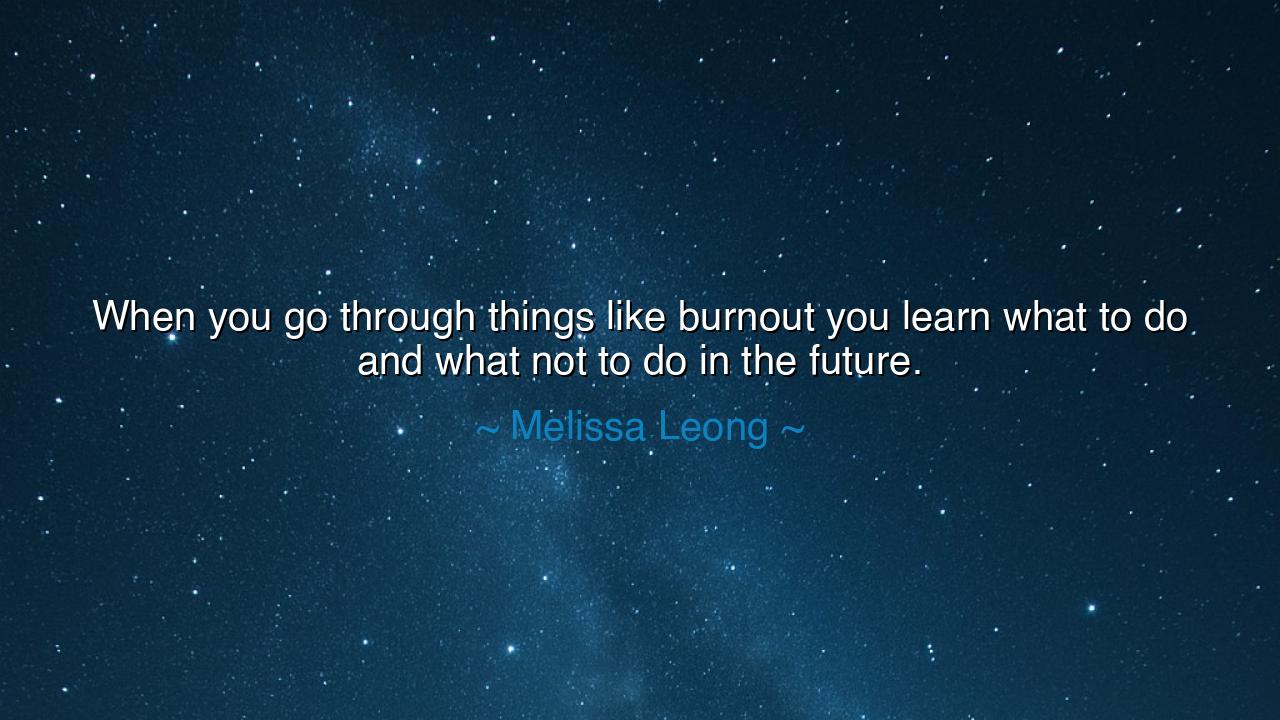
When you go through things like burnout you learn what to do and
When you go through things like burnout you learn what to do and what not to do in the future.






"When you go through things like burnout you learn what to do and what not to do in the future." With these words, Melissa Leong reflects on a profound truth: the experiences of hardship, particularly those that leave us feeling exhausted and drained, offer us the wisdom to navigate the future with greater understanding and insight. Burnout, that silent destroyer of creativity, motivation, and energy, is a reminder that we are not infallible, and that even the most driven among us must be mindful of balance and self-care. In Leong's reflection, there is a quiet lesson that through our struggles, we become better equipped to recognize the boundaries of what we can endure, and we learn the sacred art of listening to our own needs.
In the ancient world, great thinkers and philosophers often spoke of the delicate balance between work and rest. Aristotle, in his pursuit of virtue, emphasized the importance of balance in life, not as an absence of effort, but as a harmony between all things. He understood that a life of virtue required not just the pursuit of excellence, but the restoration of the soul—the rejuvenation of one’s energy. He warned against excess, recognizing that when we push ourselves too hard, we risk exhaustion and the loss of purpose. Burnout is, in essence, the excessive pursuit of goals without the necessary recovery, and through it, we often find that true wisdom lies in the ability to pace ourselves, to recognize when we are pushing too far.
Similarly, the Stoics, such as Seneca, believed that wise living required not just mental fortitude but the ability to discern when the body and mind were in need of rest. Seneca wrote extensively about the importance of leisure and reflection, understanding that constant striving without pause leads to a life of fragmentation, where one’s true sense of purpose is lost. Burnout, then, is a warning, a signal that we must step back and reassess our actions. For Seneca, and for all of us, this struggle of overexertion is a reminder that life is not about endless toil, but about finding balance and understanding the rhythms of our inner selves.
Consider the example of Leonardo da Vinci, whose genius spanned art, science, engineering, and countless other disciplines. Despite his extraordinary talents, da Vinci was known to burn out—he would sometimes abandon projects and focus on others, never completing all his work. But in his restless pursuit of knowledge, Leonardo learned that creativity and innovation require space to breathe. In his later years, da Vinci reflected on his past mistakes, and the lesson he imparted was clear: that true mastery comes not from constant work, but from allowing the mind to rest and recharge. His life is a testament to Leong's words: through burnout, we learn what works and, more importantly, what does not.
Leong's insight into burnout also highlights the human capacity for growth through failure. It is in the experience of struggle that we gain the wisdom to avoid repeating the same mistakes. Mahatma Gandhi understood this when he led his people through decades of struggle for Indian independence. Despite facing moments of exhaustion and doubt, Gandhi’s journey was marked by a deep resilience that allowed him to rise after each fall. He learned from each battle, each defeat, and each moment of despair. Through his personal experiences of burnout, he refined his methods and found greater clarity in his vision, understanding that his power came from pacing himself and knowing when to step back and rejuvenate.
The lesson from Leong’s reflection is both humbling and empowering. Burnout is not merely a failure or weakness, but a signal from our inner selves that we must take pause, reflect, and adjust our approach. It teaches us that the pursuit of our goals must be balanced with care for our well-being, and that the most meaningful achievements are those that come not from constant exertion, but from sustained, thoughtful effort. By learning from burnout, we understand the value of rest and recovery, and we realize that wisdom does not come from the ability to endure forever, but from knowing when to rest and when to recharge.
In practical terms, we can all take Leong’s lesson to heart by learning to listen to our bodies and minds. Instead of pushing ourselves endlessly, we should prioritize self-care—whether through physical rest, emotional reflection, or mental rejuvenation. In our daily lives, let us build in moments of pause, where we step back, reassess, and ensure that we are moving forward with clarity and purpose. Balance, as the ancients taught, is not about avoiding hard work, but about finding the harmony between effort and rest, between action and reflection. As we continue on our personal journeys, let us remember that burnout is not an end, but a teaching, a signpost on the road to wisdom and fulfillment.






AAdministratorAdministrator
Welcome, honored guests. Please leave a comment, we will respond soon